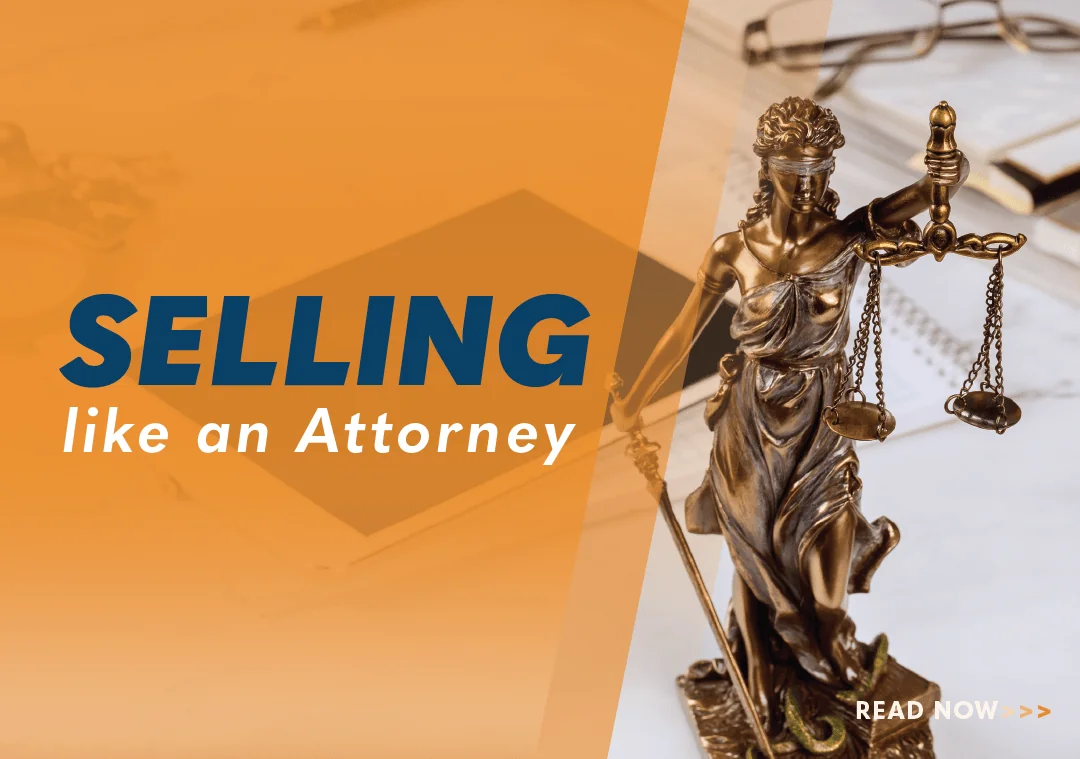Selling Like An Attorney

Have you ever been on a sales call where you were convinced that your prospect was using an inadequate product or solution, yet they seemed to dismiss every argument you presented? At that moment, you likely wished you had a wider range of skills to deconstruct their flawed reasoning and effectively deliver an opposing viewpoint. Attorneys possess the ability to uncover facts and employ evidence to win the battle of words daily. In this article, we delve into the techniques borrowed from attorneys that can empower sales professionals to build a compelling case and successfully win over even the most resistant prospects.
In the legal field, attorneys use arguments to resolve disputes between parties. This helps society manage complexity, have better relationships, and be more productive. Interestingly, salespeople share a similar purpose. Sales professionals resolve complex business challenges, build relationships with clients, and facilitate transactions, allowing companies to be more productive. By recognizing this parallel, sales professionals can gain deeper insights into how decision-makers make decisions.
When “The Godfather,” Don Corleone uttered the iconic line, “A lawyer with a briefcase can steal more than a hundred men with guns,” he expressed a profound insight into the power of words and the unique skills of attorneys. He suggests that knowledge, strategy, and expertise can be far more effective in achieving one’s objectives than brute force.
In this context, Don Corleone highlighted how influential and effective lawyers are at resolving complex issues. This quote suggests that intelligence, attention to detail, and strategic thinking can be far more potent tools for achieving one’s goals than sheer strength or aggression. Understanding the tools attorneys use to win an argument will help sales professionals at all stages of their career counter illogical arguments and influence decision-makers.
Think Like an Attorney
Thinking like an attorney doesn’t require a law degree. Attorneys are skilled in the art of logical persuasion, employing techniques that involve analyzing facts, reviewing evidence, and drawing logical inferences. Their goal is to construct an airtight case that compels decision-makers to accept their arguments. Similarly, sales professionals strive to present their products or services in such a compelling manner that decision-makers feel obliged to say yes.
One key strength of attorneys is their ability to break down complex situations into manageable components and evaluate each one independently before drawing a conclusion. Surprisingly, most of us tend to reach conclusions first and then analyze the supporting evidence, a cognitive bias known as a rush to judgment.
Legal analysis, on the other hand, proceeds methodically, sequentially examining each element and weighing the evidence. Only once the facts are thoroughly analyzed and aligned can the attorney establish proof beyond a reasonable doubt.
Unfortunately, the rush to judgment is a common pitfall for inexperienced or untrained salespeople. They hastily assume that a lead is ready to make a purchase without properly engaging in crucial steps of the sales process. Building rapport, conducting discovery, asking relevant questions, or qualifying the prospect are often disregarded as a result.
Here at Janek, we call these components Critical Selling Skills. For the inexperienced, they jump straight into presenting their case and making closing arguments, only to be left perplexed when the decision-maker doesn’t respond positively. The typical result is a no-decision, which is like a hung jury for an attorney.
In such cases, the salesperson may have relied on circumstantial evidence, which sophisticated buyers can easily refute. It is essential to recognize that circumstantial evidence holds little weight with modern buyers. Examples of circumstantial evidence include talking about company history and product features. Decision-makers are craving hard evidence of how they will benefit from your solution. By adopting a more analytical and sequential approach, sales professionals can build a stronger case, address the critical components, and present compelling evidence that resonates with decision-makers.
Loose Thread Theory
The “loose thread” theory in law is rooted in the idea that a seemingly insignificant or minor detail within evidence can have far-reaching implications and potentially dismantle an entire case or argument.
In the context of sales, the loose thread theory emphasizes the significance of meticulous attention to detail and a comprehensive examination of every aspect of the sales process. It recognizes that even seemingly insignificant elements can have a profound impact on the overall outcome. By identifying and addressing these loose threads, sales professionals can strategically challenge the status quo or objections and pave the way for the successful adoption of their solutions.
Let’s consider a scenario where you believe your solution can greatly benefit a particular company. However, the decision-maker proudly asserts their status as the market leader, boasting about their record-breaking sales achievements and a perception of everything being perfectly optimized. In such cases, directly stating that you can improve their performance will likely not resonate, as it can be perceived as arrogant to offer help to those already deemed successful. This is when you need to find the loose thread.
To navigate this situation effectively, you break down the factual components contributing to the company’s success. You delve into details such as the number of salespeople, the volume of leads they manage, the closing rate, and the average recurring revenue per client. Drawing from your experience, you know that high-growth companies often handle a significant influx of leads. So, you pose the question, “Have you ever calculated the cost of losing just one deal per week?”
By introducing this thought-provoking question, you invite the decision-maker to consider the potential impact of losing even a single deal amidst their otherwise successful operations. This opens the opportunity for a deeper discussion as you explore the implications and potential areas for improvement. The loose thread question allows you to challenge their perspective, uncover possible pain points, and demonstrate the value your solution can bring. You ultimately position yourself as a problem-solver and enhance your chances of securing the deal.
Then, with all the facts, you pull the thread and follow the evidence. With 10 salespeople and an average of $1,000 per month per deal, losing just one deal a week per rep could cost this market leader over $500,000 in revenue a year. This seemingly small problem quickly compounds into a substantial revenue loss, even for a market leader. Rational decision-makers recognize the importance of addressing issues when they reach a critical magnitude.
Fact Gathering
Facts play a crucial role for both attorneys and salespeople. However, salespeople need to approach gathering facts differently to avoid pressuring decision-makers. Unlike attorneys who use a probing strategy to elicit proof through questioning, salespeople aim to create a comfortable environment that encourages open dialogue. One powerful question that shifts the burden of proof is, “Help me understand?” By using this question, salespeople allow decision-makers to explain their logic and reasoning without feeling like they’re being interrogated.
Applying this approach to the previous example, imagine the decision-maker states, “We are the market leader and setting sales records.” Instead of bombarding them with more questions, the salesperson responds with genuine enthusiasm, acknowledging their success and saying, “Wow, congratulations! It sounds like your team is experiencing significant growth. I’m curious—could you help me understand how many salespeople are on your team?”
This approach fosters a business conversation rather than a cross-examination. By incorporating probing questions into a natural flow of dialogue and requesting assistance, salespeople allow decision-makers to talk about themselves and their accomplishments willingly. This opens the conversation, building rapport and trust. Toward the end, the salesperson can smoothly introduce one final question, the “loose thread” question, which can challenge the decision-maker’s perception of their own facts.
Setting Precedent
Modern buyers are increasingly unresponsive to traditional salespeople who exhibit traits such as being pushy, manipulative, or salesy. Instead, they are drawn to the logic and rationale behind the salesperson’s argument. When a prospect’s desired outcome aligns with those of a past client, it becomes a persuasive argument. This is what attorneys refer to as precedent. Salespeople can benefit from showcasing evidence of successfully solving problems for others, as it helps establish trust and credibility and is highly compelling. Precedent sells.
In law school, professors often emphasize the importance of controlling the facts to gain an advantage in a case. Similarly, for salespeople, when a decision-maker presents facts, it is crucial to discern whether they are a genuine concern or a diversionary tactic. For instance, if a prospect claims a lack of budget, it could be true or a smokescreen concealing other underlying issues.
Just as attorneys meticulously examine the factual components of the opposing party’s claim, salespeople must advocate for their company and diligently establish the reliability of the decision-maker’s statements. In the legal realm, without evidence, a claim does not hold.
In Conclusion
Attorneys are experts at wielding the power of words, recognizing the importance of precision and clarity. In both law and sales, credibility is paramount. Pursuing victory at any cost often comes with a hefty price tag. Instead, focus on building trust and maintaining integrity throughout the sales process. By embracing the principles of logic, evidence, and precedent, sales professionals can adopt an attorney’s mindset and enhance their persuasive abilities.
Salespeople who incorporate lessons from attorneys can make a compelling argument to close the deal. In the words of all seasoned attorneys, “I rest my case.”
Comments are closed.

- Account Planning (11)
- Awards (50)
- Client Testimonial (37)
- Personal Branding (19)
- Podcast (11)
- Research (68)
- Sales Career Development (85)
- Sales Coaching (154)
- Sales Consulting (133)
- Sales Culture (164)
- Sales Enablement (340)
- Sales Leadership (108)
- Sales Management (242)
- Sales Negotiation (16)
- Sales Prospecting (124)
- Sales Role-Playing (18)
- Sales Training (229)
- Selling Strategies (255)
- Soft Skills (67)
- Talent Management (92)
- Trusted Advisor (27)
- Virtual Selling (41)
- Webinar (10)






























I often think the loose thread is the flag for the prospect who either hates potentially being wrong or a clue they like to argue as a means of deciding if they can respect you. They are either trying to hide that fear or they are testing to see how good the salesperson is at their craft.
It’s like the baseball batter who is certain a fastball is coming then swings at and misses a curve ball. Throw a curve and change the subject. Maybe ask a question about an unrelated aspect of their job or business to distract their preset thought process. Be prepared for their response.
Selling like an Attorney reinforces using the JANEK model to underpin strategy, combined with subject area knowledge base and evidence (in healthcare – clinical evidence to align outcomes) supporting precedent. My take away – ask the right questions to understand, draw on subject area knowledge, selling strategy and use clinical evidence to support every selling call.